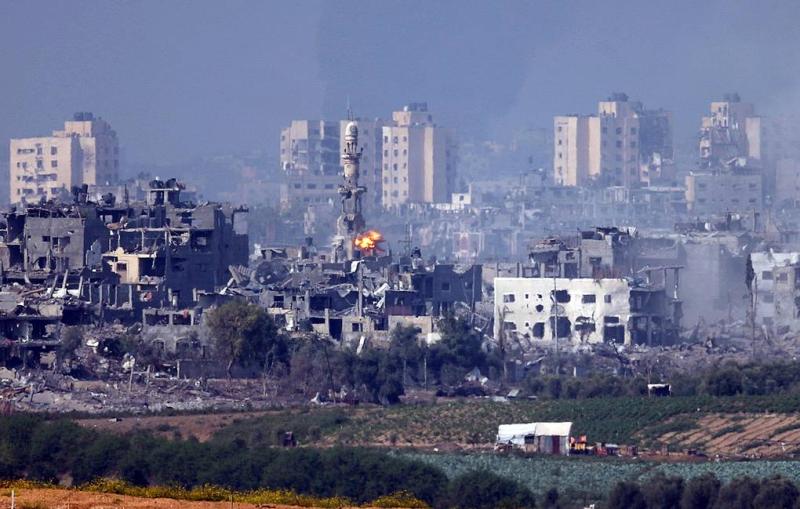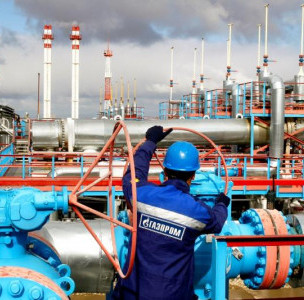
Israel may be prepared to agree to a longer-term ceasefire in Gaza if Hamas releases all captives; Iran is set to sign a duty-free trade pact with the Eurasian Economic Union (EAEU); and Russia is establishing a new African Corps to provide military and security assistance on the continent. These stories topped Friday’s newspaper headlines across Russia, according to TASS News Agency.
Izvestia: Israel signals readiness for lengthy ceasefire in Gaza if Hamas frees hostages
Israel may be willing to consider negotiating a cessation of hostilities with radical Palestinian movement Hamas that would be considerably longer than the truce agreed upon in late November, Dmitry Gendelman, adviser to Israeli Prime Minister Benjamin Netanyahu, told Izvestia. However, he stated that such a ceasefire would be conceivable only if Hamas releases all of the hostages its militants currently hold. The parties to the conflict in the Gaza Strip have now reactivated negotiations through the mediation of Qatar and Egypt.
"Israel was willing to agree to a week-long ceasefire in exchange for the release of 40 hostages. But because Hamas rejected these demands, everything has come to a halt. It appears that the parties will now try to reach an agreement that, in theory, will suit everyone," Gendelman told the newspaper.
At the same time, Israel does not rule out the idea of suspending the war for an extended length of time. "If we are talking about all the Hamas hostages who will be released, then, probably, Israel will be ready to suspend military operations for a longer period than one week," he noted.
According to several Western media sources, the ceasefire proposal was under consideration in Egypt, which remains a vital mediator in efforts to resolve the Palestinian-Israeli conflict. On December 20, Hamas political leader Ismail Haniyeh arrived in Cairo for talks with Egyptian officials.
"The fact that Haniyeh arrived [in Cairo] is certainly positive, but this does not mean that no negotiations were going on prior to this. They were held every day, with the participation of the US, Qatar and Israel. Egypt has now joined the process. Of course, prior truces have demonstrated that if the political leadership suddenly agrees on anything, it signifies that this is a consensus choice (involving Hamas’ military leadership as well - Izvestia). However, there is also a sophisticated coordination mechanism within Hamas itself. The military wing [of the Palestinian movement] continues to see things differently on the ground and does not believe their potential has been exhausted. They understand that they can still cause harm to Israel," Ruslan Mamedov, head of research at the Primakov Center for Foreign Policy Cooperation, told Izvestia.
Kommersant: Eurasian Economic Union members, Iran set to sign agreement on duty-free trade
A free trade deal between the member states of the Eurasian Economic Union (EAEU) and Iran may be signed on Monday at a summit of the five countries' leaders, according to Eurasian Economic Commission Trade Minister Andrey Slepnev. Unlike the "temporary" free trade zone with the Islamic Republic, which has been in effect since 2019, the new pact envisions a reduction in duties affecting 90% of all commodities and more than 99% of deliveries from EAEU countries, which would be Iran's first such trade deal. Increased deliveries of both foodstuffs and industrial products are expected, resulting in a threefold increase in trade turnover. Suppliers, on the other hand, are anxious about payment concerns and the nuances of doing business with Iran in the face of long-term Western sanctions.
The EAEU members and Iran have completed negotiations on the establishment of a free trade zone, Slepnev noted. The trade turnover between the EAEU and Iran has already more than doubled in the past three years, rising from $2.5 bln in 2019 to $6.2 bln at the end of 2022. According to the minister, the new arrangement will facilitate an expansion of deliveries to $18-20 bln per year within five to seven years.
Russia’s exports to Iran are significant, but import flows in the opposite direction are noticeably more modest. This imbalance impacts the ability to execute payments in the trade partners’ respective national currencies but the gap could be closed somewhat by means of equipment components deliveries and "generous quotas" for agricultural goods.
Experts interviewed by Kommersant do not anticipate competition from Chinese goods, the supply of which is fast increasing as such potential competition is limited by both the level of technology and production volumes.
At the same time, a source in EAEU business circles told the newspaper that, regarding Iran, the business community is largely concerned with settlement issues and the country’s complicated foreign exchange system that features three different rates of exchange for the Iranian rial in foreign trade settlements: the open market rate, the official rate and the so-called NIMA rate. As well, doing business in Iran is hampered by the country’s closed economy.
Vedomosti: Russia creates new African Corps for military cooperation on continent
Russia has started work on creating the so-called African Corps to replace the Wagner Private Military Company (PMC) formations that are now operating on the continent. The military structure is expected to be up and running in five African countries by the summer of 2024, two sources close to the Russian Defense Ministry told Vedomosti. The start of the project was also confirmed by a source in RSB-Group, a private security company that trains security forces in Burkina Faso (and was sanctioned by the EU on December 18).
The newspaper’s sources say that African Corps units are currently deployed or are planning to deploy in Burkina Faso, Libya, Mali, the Central African Republic (CAR) and Niger. The new structure will report directly to the Defense Ministry and will be overseen by Deputy Defense Minister Colonel General Yunus-bek Yevkurov. "He stipulates the terms and conditions for the work of the [African Corps] contingents in interactions with the authorities of those countries that are interested in cooperation," a source familiar with the matter told Vedomosti.
According to another source, the African Corps is being formed from former Wagner PMC units and individual fighters who left the group. Work on forming the African Corps began in August 2023, following the death of Wagner founder Evgeny Prigozhin.
A Vedomosti source close to the Defense Ministry said that, "structures of other law enforcement agencies" and private security groups affiliated with Russian corporations would operate in Africa alongside the African Corps. According to one of Vedomosti's sources, recruitment began in December not only in Africa, but also in Russia.
According to Grigory Lukyanov, researcher at the Russian Academy of Sciences' Institute of Oriental Studies, the African Corps is not similar to Western and Asian security corporations that have been functioning in Africa for the last 30 years. This is not security or trainers, he believes, but a "unique product" capable of carrying out military operations.
Ivan Konovalov, the author of several books on armed conflicts in Africa, said that security cooperation with the USSR, and later Russia, had a significant positive impact on African countries. It would be incorrect to forsake the legacy of such cooperation and the benefits it brings both partners, and thus efforts to retain such cooperation are justified, the expert believes.
Izvestia: Russia halves share of 'toxic' currencies in export payments
Since the beginning of the year, the share of "toxic" currencies in Russian export payments has nearly halved. According to Central Bank of Russia data, such currencies accounted for less than a quarter (24.7%) of total revenues in October. The main reasons for this are sanctions that make payments in dollars and euros difficult, as well as Russia’s requirement that Western countries pay for energy resources in rubles, and the development of partnerships with China and African countries, both of which are actively switching to making payments for exports in national currencies. At the same time, economists warn of risks, namely that a drop in the volume of hard currency in the Russian domestic economy could trigger depreciation of the ruble.
The currencies of friendly countries aggressively compete with the dollar and euro in settlements, Izvestia writes. Since the beginning of the year, their share of export revenues has more than doubled to 37%. At the same time, the Chinese yuan accounts for the bulk of this figure; according to the Bank of Russia, it accounted for 33% of all export payments in October, Digital Broker analyst Natalya Pyryeva said.
Overall, the increased use of national currencies and the ruble in payments for Russian exports demonstrates that Russia no longer trusts the dollar or the euro, senior analyst at Freedom Finance Global Natalya Milchakova told Izvestia. At the same time, there is reduced reliance on major reserve currencies around the world, due not only to sanctions, but also to the enormous US public debt and the country's credit rating.
However, as the ruble's use in financial and commercial payments grows, the state receives less foreign currency, which directly affects the ruble's exchange rate, according to Finam Financial Group analyst Alexander Potavin.
At the same time, the transition to payments in national currencies is still good for exporters since it decreases the risks inherent in sanctions, according to Finam Financial Group's analytical department.
Nezavisimaya Gazeta: Pentagon concerned about Beijing’s construction of nuclear test site
Deep vertical mines and ground infrastructure have been built in the desert of northern China, where the first Chinese nuclear weapon was detonated in 1964, according to US satellites. This has led the Pentagon to believe that Beijing is considering another nuclear test, Nezavisimaya Gazeta writes. Washington has long feared that China would surpass the US in the strength of its nuclear arsenal. However, experts believe that China would not violate the Comprehensive Nuclear-Test-Ban Treaty (CTBT) and is only trying to avoid being left behind if the US takes such a step first.
Some US observers believe that China may be pursuing a comprehensive nuclear modernization that could create a new level of nuclear competition. According to these analysts, China's activities, as well as those of other nuclear powers, could jeopardize the 1996 CTBT agreement, the newspaper writes.
Academic Alexey Arbatov told Nezavisimaya Gazeta: "Beijing will not be the first to take such a step and will not resume nuclear tests. Even as it increases its nuclear arsenal, China maintains its anti-nuclear stance. The country advocates nuclear disarmament and calls on Russia and the United States to follow the path of disarmament and abide by the treaty. China's activity is similar to what the United States is doing in Nevada and Russia is doing in Novaya Zemlya. This is a practice run in case more countries withdraw from the CTBT."
Vasily Kashin, a senior researcher at the Higher School of Economics, noted that China appears to be taking certain precautions in case the treaty is no longer adhered to, which may happen, as Russia and the US have already traded mutual allegations that the other was planning nuclear tests.
TASS is not responsible for the material quoted in these press reviews









